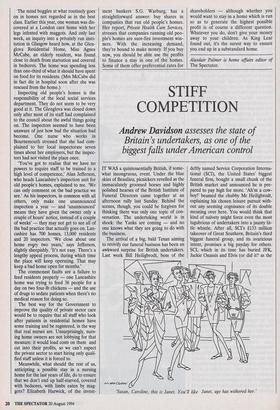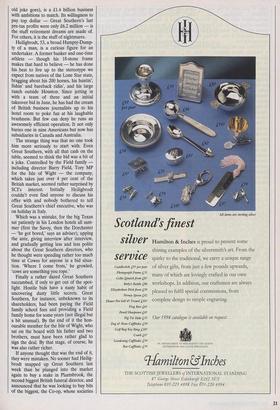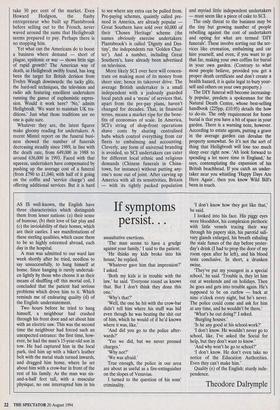STIFF COMPETITION
Britain's undertakers, as one of the biggest falls under American control
IT WAS a quintessentially British, if some- what incongruous, event. Under the blue skies of Beaulieu, picnickers revelled as the immaculately groomed horses and highly polished hearses of the British Institute of Funeral Directors came together at an afternoon rally last Sunday. Behind the scenes, though, you could be forgiven for thinking there was only one topic of con- versation. The undertaking world is in shock: the Yanks are coming — and no one knows what they are going to do with the business.
The arrival of a big, bald Texan aiming to revivify our funeral business has been an awkward surprise for British undertakers. Last week Bill Heiligbrodt, boss of the deftly named Service Corporation Interna- tional (SCI), the United States' biggest funeral firm, bought a small chunk of the British market and announced he is pre- pared to pay high for more. `Ah'm a cow- boy!' beamed the chubby Mr Heiligbrodt, explaining his chosen leisure pursuit with- out any seeming cognisance of its double meaning over here. You would think that kind of naivety might force even the most lugubrious of undertakers into a jaunty lit- tle whistle. After all, SCI's £133 million takeover of Great Southern, Britain's third biggest funeral group, and its avaricious intent, promises a big payday for others. SCI, which in its time has buried JFK, Jackie Onassis and Elvis (or did it? as the `Susan, Caroline, this is Janet. You'll like Janet, age has withered her.' old joke goes), is a £1.4 billion business with ambitions to match. Its willingness to pay top dollar — Great Southern's last pre-tax profits were only £6.2 million — is the stuff retirement dreams are made of. For others, it is the stuff of nightmares.
Heiligbrodt, 53, a broad Humpty-Dump- ty of a man, is a curious figure for an undertaker. A former banker and one-time athlete — though his 18-stone frame makes that hard to believe — he has done his best to live up to the stereotype we expect from natives of the Lone Star state, bragging about his 200 horses, his huntin', fishin' and bareback ridin', and his large ranch outside Houston. Since jetting in with a team of three and an initial takeover bid in June, he has had the cream of British business journalists up to his hotel room to poke fun at his laughable brashness. But few can deny he runs an awesomely efficient operation. It not only buries one in nine Americans but now has subsidiaries in Canada and Australia.
The strange thing was that no one took him more seriously to start with. Even Great Southern, with all that cash on the table, seemed to think the bid was a bit of a joke. Controlled by the Field family including director Barry Field, Tory MP for the Isle of Wight — the company, which takes just over 4 per cent of the British market, seemed rather surprised by SCI's interest. Initially Heiligbrodt couldn't even find anyone to discuss his offer with and nobody bothered to tell Great Southern's chief executive, who was on holiday in Italy.
Which was a mistake, for the big Texan sat patiently in his London hotels all sum- mer (first the Savoy, then the Dorchester — 'he got bored,' says an adviser), upping the ante, giving interview after interview, and gradually getting less and less polite about the Great Southern directors, who he thought were spending rather too much time at Cowes for anyone in a bid situa- tion. 'Where I come from,' he growled, `cows are something you rope.'
Finally a rather dazed Great Southern succumbed, if only to get out of the spot- light. Hostile bids have a nasty habit of uncovering dusty little secrets. Great Southern, for instance, unbeknown to its shareholders, had been paying the Field family school fees and providing a Field family home for some years (not illegal but a bit unusual). By the end of it the hon- ourable member for the Isle of Wight, who sat on the board with his father and two brothers, must have been rather glad to sign the deal. By that stage, of course, he was also rather richer.
If anyone thought that was the end of it, they were mistaken. No sooner had Heilig- brodt snapped up Great Southern last week than he plunged into the market again to buy a stake in Plantsbrook, the second biggest British funeral director, and announced that he was looking to buy bits of the biggest, the Co-op, whose societies take 30 per cent of the market. Even Howard Hodgson, the flashy entrepreneur who built up Plantsbrook before selling out to the French, never waved around the sums that Heiligbrodt seems prepared to pay. Perhaps there is no stopping him.
Yet what can the Americans do to boost a business where demand — short of plague, epidemic or war — shows little sign of rapid growth? The American way of death, as Heiligbrodt swiftly found, has long been the target for British derision from Evelyn Waugh downwards: the tacky glitz, the hard-sell techniques, the television and radio ads featuring emollient undertakers running the gamut of euphemistic expres- sion. Would it work here? 'No,' admits Heiligbrodt. 'We want to maintain UK tra- ditions.' Just what those traditions are no one is quite sure.
Whatever they are, the latest figures make gloomy reading for undertakers. A recent Mintel report on the funeral busi- ness showed the number of funerals decreasing steadily since 1989, in line with the death rate, from 649,000 in 1988 to around 636,000 in 1993. Faced with that squeeze, undertakers have compensated by pushing up the average cost of a funeral (from £790 to £1,040, with half of it going on the coffin and 'service charge') and offering additional services. But it is hard to see where any extra can be pulled from. Pre-paying schemes, quaintly called pre- need in America, are already popular Great Southern have sold over 60,000 of their 'Chosen Heritage' scheme (the names obviously exercise undertakers: Plantsbrook's is called 'Dignity and Des- tiny', the independents run 'Golden Char- ter'). And a number, including Great Southern's, have already been advertised on television.
More likely SCI over here will concen- trate on making most of its money from sheer size; hence its takeover drive. The average British undertaker is a small independent with a jealously guarded local patch and a 'menu' of services that, apart from the pre-pay plans, haven't changed for decades. That, in financial terms, means a market ripe for the bene- fits of economies of scale. In America, SCI's string of shop-front operations shave costs by sharing centralised hubs which control everything from car fleets to embalming and accounting. Cleverly, any form of universal branding is avoided, so SCI undertakers can cater for different local ethnic and religious demands (Chinese funerals in China- town, for instance) without putting any- one's nose out of joint. After carving up America with all its sensitivities, Britain — with its tightly packed population and myriad little independent undertakers — must seem like a piece of cake to SCI.
The only threat to the business may be the tiny but growing number of people rebelling against the cost of undertakers and opting for what are termed 'DIY funerals'. These involve sorting out the ser- vices like cremation, embalming and car hire yourself, and even, if you want to go that far, making your own coffins for burial in your own garden. (Contrary to what most people believe, provided you get a proper death certificate and don't create a health hazard, it is quite legal to bury your- self and others on your own property.) The DIY funeral will become increasing- ly popular, predicts a spokesman for the Natural Death Centre, whose best-selling handbook (225pp, £10.95) details the how to do-its. The only requirement for home burial is that you have a bit of space in your garden. There is a warning note, however. According to estate agents, putting a grave in the average garden can devalue the property somewhat. So it's not the sort of thing that Heiligbrodt will lose too much sleep over right now. 'All look forward to spending a lot more time in England,' he says, contemplating the expansion of his British beachhead. If you catch an under- taker near you whistling 'Happy Days Are Here Again', then you know Wild Bill's been in touch.




















































 Previous page
Previous page